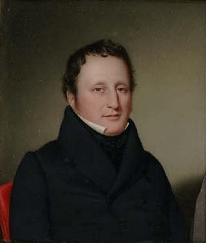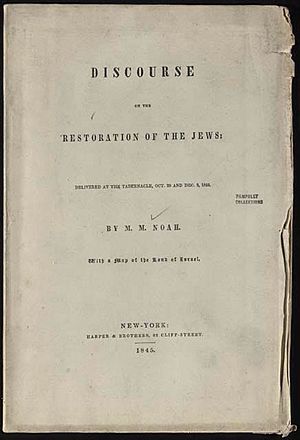Mordecai Manuel Noah facts for kids
Quick facts for kids
Mordecai Manuel Noah
|
|
|---|---|
 |
|
| Born | July 14, 1785 |
| Died | March 22, 1851 (aged 65) New York City, US
|
| Occupation | Diplomat, journalist, playwright |
| Known for | Jewish toleration |
Mordecai Manuel Noah (born July 14, 1785, in Philadelphia, Pennsylvania; died May 22, 1851, in New York) was an important American figure. He worked as a sheriff, a writer of plays (playwright), a diplomat, and a journalist. He was also known for his ideas about creating a special place for Jewish people.
Noah came from a family of Portuguese Sephardic background. He became a leading Jewish community leader in New York in the early 1800s. He was the first Jewish person born in the United States to become famous across the country.
Contents
A Look at His Career
Mordecai Manuel Noah was involved in business and law early in his life. After moving to Charleston, South Carolina, he started focusing more on politics.
Noah's Views on Society
Noah held strong views on society during his time. He wrote about the idea that freeing enslaved people might cause problems for the country. Because of his views, some people, like the Freedom's Journal newspaper, called him "the black man's bitterest enemy."
Noah wrote a play called Fortress of Sorrento. White theaters did not want to perform it. However, the African Grove Theater, which was a theater for African-American performers, did stage his play. Noah became very upset about this. He took action against the theater, saying it was against the law.
Serving as a Diplomat
In 1813, President James Madison chose Noah to be the American consul in Tunis. Tunis was a country in North Africa. In this role, Noah helped free American citizens who were being held as slaves by Moroccan slave owners.
However, in 1815, Noah was removed from his job. The U.S. Secretary of State, James Monroe, said that Noah's religion was "an obstacle" to him doing his job. This decision made many people, both Jewish and non-Jewish, very angry.
Noah wrote many letters to the White House. He wanted to know why his religion was a reason to take away his job. He had done well as consul and even helped free hostages. Noah never got a clear answer. He worried that his removal would make it harder for other Jewish people to hold public jobs in the future.
Many people supported Noah. John Adams, Thomas Jefferson, and James Madison wrote letters that supported the idea of separating church and state. They also believed in tolerance for Jewish people. A well-known Jewish leader, Isaac Harby, wrote that Jewish people were not just a "religious sect" tolerated by the government. He said they were "a portion of the People" and fully part of the country.
Later Life and Projects
After his time as a diplomat, Noah moved to New York City. There, he started and edited several newspapers. These included The National Advocate, The New York Enquirer, The Evening Star, and The Sunday Times.
A Successful Playwright
In 1819, Noah's most popular play, She Would Be a Soldier, was performed. This play made Noah known as America's first important Jewish writer. Today, She Would Be a Soldier is studied in college courses.
The Ararat Project
In 1825, Noah had a unique idea. He wanted to create a special "refuge" for Jewish people from all over the world. He called this place "Ararat" after Mount Ararat from the Bible. He bought land on Grand Island in the Niagara River for this project.
Noah believed that some Native American groups were part of the Lost Tribes of Israel. He wrote a book about this idea. In another book, Discourse on the Restoration of the Jews, Noah said he believed Jewish people would return to their ancient homeland. He also called for America to help make this happen.
On September 2, 1825, a big event took place in Buffalo. Thousands of people gathered. Noah led a procession to St. Paul's Episcopal Church. A special stone was laid on the communion table. This stone read: "Ararat, a City of Refuge for the Jews, founded by Mordecai M. Noah in the Month of Tizri, 5586 (Sept. 1825) & in the 50th Year of American Independence."
Despite the ceremony, Noah's plan for Ararat did not go forward. He returned to New York soon after. The special cornerstone is now on display at the Buffalo Historical Society in Buffalo, New York. Even though his project failed, Noah's ideas about Jewish people returning to Palestine were similar to later ideas of Zionism.
Political Involvement
From 1827 to 1828, Noah was a leader in New York City's Tammany Hall political group. In his writings, he sometimes supported and sometimes opposed slavery in the southern United States. He worried that freeing enslaved people might cause the country to split apart.
Images for kids
-
The page 2 shows the map of the Land of Israel
See also
 In Spanish: Mordecai M. Noah para niños
In Spanish: Mordecai M. Noah para niños
 | May Edward Chinn |
 | Rebecca Cole |
 | Alexa Canady |
 | Dorothy Lavinia Brown |



